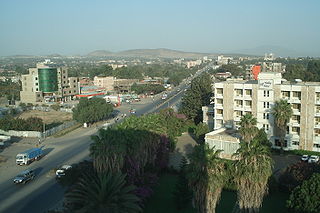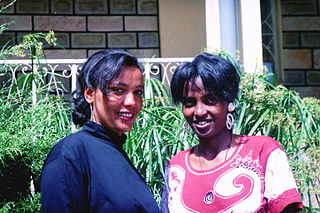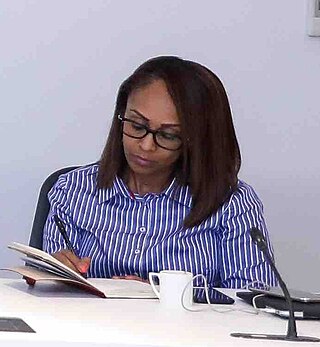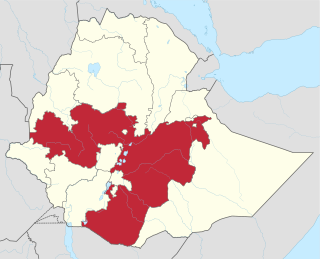
Addis Ababa University is a national university located in Addis Ababa, Ethiopia. It is the oldest university in Ethiopia. AAU has thirteen campuses. Twelve of these are situated in Addis Ababa, and one is located in Bishoftu, about 45 kilometres (28 mi) away. AAU has several associated research institutions including the Institute of Ethiopian Studies. The Ministry of Education admits qualified students to AAU based on their score on the Ethiopian University Entrance Examination (EUEE).

Adama, formerly Nazreth, is one of the cities of Oromia Region of Ethiopia. Located in the East Shewa Zone 99 km (62 mi) southeast of the capital, Addis Ababa, the city sits between the base of an escarpment to the west, and the Great Rift Valley to the east.

A women's shelter, also known as a women's refuge and battered women's shelter, is a place of temporary protection and support for women escaping domestic violence and intimate partner violence of all forms. The term is also frequently used to describe a location for the same purpose that is open to people of all genders at risk.

Violence against women (VAW), also known as gender-based violence (GBV) and sexual and gender-based violence (SGBV), is violent acts primarily committed by men or boys against women or girls. Such violence is often considered a form of hate crime, committed against persons specifically because they are of the female gender, and can take many forms.

Abiy Addi is a town in central Tigray Region, Ethiopia. Abiy Addi is at the southeastern edge of the Kola Tembien woreda, of which it is the capital.
Womankind Worldwide is a UK-based, feminist global women's rights organisation that works in solidarity with women's movements around the world to bring about lasting change in women's lives. Founded in 1989, Womankind partners with women's movements in Africa and Asia to support them in their efforts to change discriminatory laws and policies, challenge gender norms and stereotypes, and provide transformative programmes and services to women and girls.

The second battle of Tembien was fought on the northern front of the Second Italo-Ethiopian War. This battle consisted of attacks by Italian forces under Marshal Pietro Badoglio on Ethiopian forces under Ras Kassa Haile Darge and Ras Seyoum Mangasha. This battle, which resulted in a decisive defeat of Ethiopian forces, was primarily fought in the area around the Tembien Province. The battle is notable for the large-scale use of mustard gas by the Italians.

There have been several studies concerning women in Ethiopia. Historically, elite and powerful women in Ethiopia have been visible as administrators and warriors. This never translated into any benefit to improve the rights of women, but it had meant that women could inherit and own property and act as advisors on important communal and tribal matters. As late as the first part of the 20th century, Queen Menen, consort of Emperor Haile Selassie I, had a decisive role in running the Ethiopian Empire. Workit and Mestayit regents to their minor sons have been held responsible for their provinces. They owed their rights to landed property because of a special type of land tenure that expected tenants to serve as militia to overlords, irrespective of gender. In 1896, Empress Tayetu Betul, wife of Emperor Menelik II, actively advised the government and participated in defending the country from Italian invasion. Prominent and other landowning women fought against the second invasion in 1935–41. With the assistance of European advisors, women in the ensuing period were kept out of the army and politics, even as advisors. Instead, they were restricted to family and household work of raising children and cooking. With a steady increase in female representation in education, they have started to undertake nursing, teaching, and other similarly supportive roles. Over the 2018–2019 period, their gradual participation in state politics has been increasing at a steady pace.

Yetnebersh Nigussie is an Ethiopian lawyer and disability rights activist. In 2017, she was awarded the Right Livelihood Award for "her inspiring work promoting the rights and inclusion of people with disabilities, allowing them to realise their full potential and changing mindsets in our societies."
Women's health in Ethiopia can be broken down into several sections: general health status, women's status, maternal health, HIV, harmful traditional practices, and violence against women.

Meaza Ashenafi is an Ethiopian lawyer. In November 2018, she was appointed by the Federal Parliamentary Assembly as President of the Federal Supreme Court of Ethiopia until her resignation on 17 January 2023.
Hilina Berhanu Degefa is an Ethiopian women's rights activist and researcher. She is a co-founder of The Yellow Movement, a youth-led feminist advocacy and empowerment program based in Addis Ababa and Mekelle University. She was a 2015 recipient of a Mandela Washington Fellowship for Young African Leaders, the youngest to receive the honor at the age of 22. Hilina is also a Women Deliver Young Leaders Fellow, class of 2020. She is the first Ethiopian civil society representative to brief the UN Security Council.

Billene Seyoum Woldeyes is an Ethiopian politician, poet and author who is serving as the Foreign Press Secretary for the Office of Prime Minister of Ethiopia since 5 November 2018. Billene speaks as the prime minister's foreign spokesperson in English.

Carceral feminism is a critical term for types of feminism that advocate for enhancing and increasing prison sentences that deal with feminist and gender issues. The term criticises the belief that harsher and longer prison sentences will help work towards solving these issues. The phrase "carceral feminism" was coined by Elizabeth Bernstein, a feminist sociologist, in her 2007 article, "The Sexual Politics of the 'New Abolitionism'". Examining the contemporary anti-trafficking movement in the United States, Bernstein introduced the term to describe a type of feminist activism which casts all forms of sexual labor as sex trafficking. She sees this as a retrograde step, suggesting it erodes the rights of women in the sex industry, and takes the focus off other important feminist issues, and expands the neoliberal agenda.

A October 2019 Ethiopian clashes was a civil unrest that broke out in Addis Ababa, on 23 October 2019 and swiftly spread to entire Oromia Region after activist and Director of Oromia Media Network, Jawar Mohammed reported on his Facebook page around midnight, on Tuesday. In his post, Jawar has said that his house was surrounded by police officers and that they tried to withdraw his security guards from their posts. His VIP security detail was assigned to him by the government once he arrived from the US. According to official reports, 86 people were killed, 76 were killed by Communal violence, while 10 were security forces of Ethiopia.
Sehin Teferra is an Ethiopian feminist activist who promotes the idea of Ethiopian identity and sees herself as pan-Ethiopianist.
Yikono is a grassroots women's rights group based in Tigray Region in Ethiopia that is opposed to gender-based violence.
On 18 October 2021, the Ethiopian Air Force conducted two airstrikes on the city of Mekelle in the Tigray Region of Ethiopia during the Tigray War. 3 children were killed in the strikes.

Women role in the education of Ethiopia remains progressive over time. Over the last 20 years, the national government made an effort to comfort equitable opportunities for females in public education. Many female students have limited access to education, which may cause negative economic impact in the country. In Ethiopia, women constitute 50% of the population that could contribute to subsistence production. According to World Data Atlas analysis in 2015, women enrollment in primary and secondary education was increased to 48.5% from 45.2% in 1992, growing at annual rate of 0.42%.
Maria Munir Yusuf is founder and director of the Association for Women's Sanctuary and Development in Ethiopia. She also co-founded the Ethiopian Women Lawyers Association.













